Student sharing - Workshop on “Unleash Your Creativity at Home”
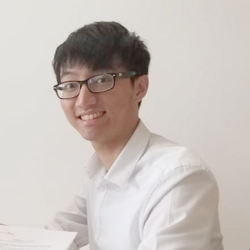
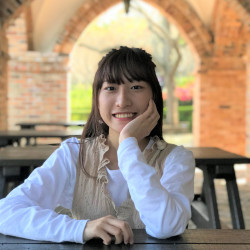
Becoming an Inspiration for Future Talents
Yip Cheuk Lun, Stephen
Tang Pui Yan, Yani
Bachelor of Education and Bachelor of Science
The Workshop “Unleash Your Creativity at Home” was organised by the Faculty School-University Partnerships Office to promote daily creativity through a series of engaging activities. The eight sessions were held online for senior primary and junior secondary students from nine local schools. Our student teachers explained the importance of creativity, introduced ways to become more creative, and carried out group activities in breakout rooms via ZOOM, which allows an online meeting to be split into separate sessions for group discussion.
Yip Cheuk Lun, Stephen and Tang Pui Yan, Yani are two of the 17 student teachers who conducted the workshop. Both are from the Bachelor of Education and Bachelor of Science programme, and both were keen to understand more about STEM education and put the theories they had learnt into practice. They felt that they had a great deal to take away from this precious learning experience.
It is hard to ask someone to think out of the box all of a sudden. Children may also feel shy about expressing their ideas when they think that they have nothing “special” to say. Yani feels that the educators’ role is to give students patient encouragement to freely express anything they can think of; teachers should show their appreciation, too. She believes that these are the first steps towards enhancing students’ creativity. Yani also learnt to become more creative herself by listening to the participants’ answers. Through inspiring children and teenagers in the workshop, the student teachers were inspired as well.
For Stephen, it was a real pleasure to assist in organising the workshop. Prior to this experience, he had never imagined running an online workshop and receiving highly positive feedback from the students. Understandably, it was challenging for the student teachers to receive immediate feedback from the participants and to find out if they were interested in these activities even though they were not face-to-face. With that in mind, throughout the whole workshop, they used different ways to keep the participants motivated, such as inviting them to share their ideas and playing interactive games with them. Stephen also enjoyed asking students questions, because he was able to evaluate their learning progress and discover interesting ideas for further discussion based on their responses. He also found that this effectively enhanced his skills in responding to students in a timely manner.
Sometimes, participants challenged the student teachers in order to observe their reactions. For example, one of the students pointed out that only people who were bored would be creative and would think of many ideas, because they had nothing else to do. Stephen had had similar feelings when he was younger, trying to challenge teachers all the time. Recalling his own experiences, he understood that if this student was ignored, he would no longer be proactive or attentive. The incident provided a good opportunity for Stephen to learn how to handle such a situation as a teacher. He engaged the student in a fruitful discussion, and eventually succeeded in convincing the student so that he no longer doubted the idea of being creative.
There was another episode which greatly impressed Yani. Due to technical issues, a student was assigned to join the same game a second time. The student’s immediate response was to reject joining, as he was afraid of having no more new ideas. He kept saying “I can’t think of anything” during the game. Fortunately, after being encouraged and guided to think from different perspectives, this student engaged fully, spoke a lot and felt much more positive. The student teachers were very happy because they knew they had successfully reached their goal, which was to let students unleash their creativity through practice.
What was more motivating was that after joining the intellectually stimulating workshop, another young student asked the student teachers how to join the Faculty of Education and become a teacher himself when he grew up. This was certainly a great encouragement for both Stephen and Yani as they felt that they had become an inspiration for the future talents. “I care about students’ feedback, and their kind words always encourage me to keep going. The success of the workshop is not only determined by how smoothly it was run, but also how much students have learnt from the workshop,” Stephen added with a smile on his face.
Embracing Cultural Diversity and Achieving Goals as a Team
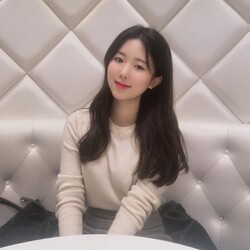
Cho Su A
Bachelor of Education and Bachelor of Science
“The ‘Unleash Your Creativity at Home’ workshop was an unforgettable experience for me,” remarked Cho Su A from the Bachelor of Education and Bachelor of Science programme. Originally, she enrolled in a course called “Fostering 4Cs (Creativity, Complex Problem-Solving Skills, Communication and Collaboration skills) through Engaging STEM/STEAM-related Experiential Learning Activities”. The Fostering 4Cs course involved preparation for the Odyssey of the Mind (OM) Hong Kong regional tournament and the OM World Finals in the Iowa State University, USA. Unfortunately, however, because of the COVID-19 pandemic, Su A and her classmates’ preparation was brought to a halt.
As an alternative, the “Unleash Your Creativity at Home” workshop was held for local senior primary and junior secondary school students. The aim of the workshop was to enhance students’ 4C skills. To cater for participants’ needs, the sessions were delivered in Cantonese. Understandably, as a non-Cantonese speaker, Su A was anxious about her ability to participate in this project. However, her worries were soon relieved, as Ms Promail Leung, the course instructor and Director of the Faculty School-University Partnerships Office, and her team members made sure that they involved her as much as they could. This allowed them to overcome the language barrier together, and enabled Su A to fully utilise her skills throughout the organisation process.
Through her involvement, she was also able to equip herself with diverse skills and knowledge as a pre-service teacher, such as communication, collaboration and technical skills, which could be essential elements for a future educator. Sometimes this occurred as a result of unexpected technical issues during the workshop. For instance, all the participants’ names and group numbers were assigned by the student teachers prior to the start of the workshop, so that they could be easily identified. However, at one point, the whole group of participants was forced to quit when being assigned to breakout rooms, and when they logged back into the online workshops, their names had been reset and become unidentifiable. Thankfully, through teamwork, Su A and her team were able to resolve the problem by renaming the participants quickly and calmly, and reassigning them into smaller groups again.
She was glad that the workshop was completed successfully: “I am pleased to be part of this workshop and of this marvellous team to facilitate students’ learning. Through this experience, I realised that education is not just about academic achievement. Rather, it is the freedom to express our ideas and to learn from one another.”
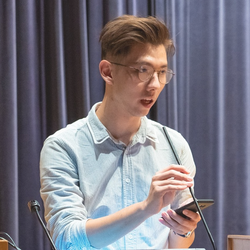
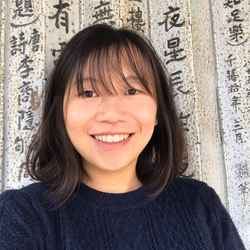
Wong Yu Yeung, Gary
Yeung Shuk Laam, Natalie
Bachelor of Education and Bachelor of Science
The “Unleash Your Creativity at Home” Workshop presented creativity challenges to senior primary and junior secondary students from nine local schools, hoping to boost their creativity. For Wong Yu Yeung, Gary, and Yeung Shuk Laam, Natalie, from the Bachelor of Education and Bachelor of Science programme, the workshop served as an innovative way to engage and inspire students during the suspension of schooling.
In the workshop, Gary, Natalie and the other team members offered fun yet cognitively challenging content. With guiding prompts, the participants came up with creative and logical solutions to the issues presented by the student teachers. Meanwhile, the student teachers recorded evidence of creativity. After the activities, they would conduct debriefs, using the Four C model of creativity (creativity, complex problem-solving skills, communication and collaboration skills; 4Cs), to help the participants understand how and why they gave such answers. These debriefs provided the participants not only with a chance of self-evaluation, but also with a sense of achievement upon completion of the activities. For Gary, the challenge was getting to know the participants’ personalities immediately, so as to be able to explain why they were thinking in certain ways. The workshop experience was indeed very different from actual teaching, where teachers have more time to develop an understanding of their students both from classroom teaching and daily conversations. Through this workshop, Gary felt that he greatly improved his interpersonal skills, allowing him to understand students’ personalities and actions better. This will undoubtedly be beneficial for his future teaching.
Natalie found the workshop effective in inspiring students to practise their creativity as well as helping them understand how to improve it. At the beginning, some students expressed their confusion and worry about giving “wrong” answers. Soon, however, they understood that there are no right or wrong answers as long as the answers are logical. It was motivating for her to observe that students were gradually able to develop their own strategies for thinking creatively.
The workshop also provided the student teachers with opportunities to reflect upon the true meanings of STEM education and the 4Cs, as well as their goals. Natalie kept in mind the purpose of STEM education while planning her part in the workshop: to empower the younger generation to look for solutions to real-life problems which they have observed, eventually improving the world.
Gary believes that the educational value of such workshops goes way beyond merely sharing facts and knowledge. Rather it is the cognitive and thinking processes that will stimulate the most unusual transformations in students. Towards the end of the workshop, the student teachers even invited the participants to brainstorm a solution to help the world overcome food crises, as predicted by the Food and Agriculture Organization of the United Nations. Seeing the responses utilising the creative strategies delivered in the workshop further reinforced Gary’s belief in the role of education in empowering the next generation.
Natalie used to think that teachers could barely do anything if a student was not already willing to learn, but she now believes that teaching is no longer limited to sharing knowledge, but also involves helping students develop a higher level of thinking. She is convinced that teachers also have the ability to inspire. Through their decisions and actions, teachers can motivate students to learn and to think metacognitively.
Careful Design and Planning for Maximised Learning Outcomes
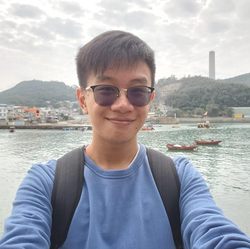
Kwok Kai Yin, Jonathan
Bachelor of Education and Bachelor of Science
Hoping to broaden his horizons by participating in the Odyssey of the Mind (OM) competitions locally and in the USA, Kwok Kai Yin, Jonathan, signed up for the experiential learning course called “Fostering 4Cs (Creativity, Complex Problem-Solving Skills, Communication and Collaboration skills) through Engaging STEM/STEAM-related Experiential Learning Activities”. Following the cancellation of the OM competition as a result of the pandemic, a series of online workshops was held for local senior primary and junior secondary students instead. Although it was not a requirement to help organise the workshop, Jonathan still participated voluntarily as he considered this workshop a wonderful learning opportunity.
Jonathan’s responsibility was to create problems for the participants to solve and to carry out group activities. As the aim of the workshop was to boost students’ creativity, both problem design and the debriefing with students were crucial. These greatly enhanced Jonathan’s ability to notice students’ characteristics of thinking and utilise his observation to give feedback to the participants. The debriefing allowed participants to understand the nature of their own creativity and which areas they needed to improve.
Not only did the student teachers teach about the 4C skills, but they also utilised such skills in different parts of the workshop, especially during the preparation. Jonathan and his team members had to plan everything from scratch. At first, they were ambitious in trying to cover all the 4C skills in just one activity. However, they soon realised it would be much better to focus on one skill at a time. After several rounds of testing and fine-tuning, they were able to come up with activities that were highly entertaining and inspiring at the same time.
Jonathan found this workshop particularly rewarding in helping students apply their creativity. In a hands-on activity, students had to choose some objects and make something new. Students were able to notice the characteristics of the objects they had chosen and tried to utilise them to build their new “products”. The participants gave very positive feedback, stating that the activity had encouraged them to be more creative and flexible in the thinking process. They were also surprised to find out that everything had been designed by the student teachers themselves, rather than being copied from online sources.
“I am also grateful for the School-University Partnerships Office’s efforts in organising the workshop and looking for participants. It was a lot of stress to cancel our participation in the OM and to change to an online workshop, but they reacted quickly and pulled everything together in such a short period of time. They were so efficient!” exclaimed Jonathan.
